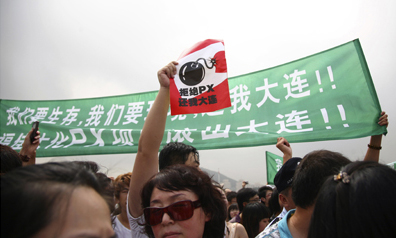New York, August 15, 2011–Information authorities in China should cease censorship of environmental protests in Liaoning province, the Committee to Protect Journalists said today.
Thousands of demonstrators called for the closure of a chemical plant on Sunday due to safety concerns after the seawall alongside the plant was damaged in a tropical storm, the reports said. Microblog services deleted images showing large gatherings of people in the port city of Dalian, while searches for the city’s name led to error messages on several Chinese websites, according to international news reports.
Some users on the Sina microblog platform had their accounts disabled for discussing the issue, according to Global Voices Online. Chinese website owners report to government information authorities and are bound by licensing agreements to comply with censorship orders, according to CPJ research.
Independent media coverage of the protests was muted. State news agency Xinhua reported mid-Sunday on the demonstrations, saying that authorities would move the plant to appease the local residents. The announcement appeared only in English, according to the Hong Kong University-based China Media Project. Searches of Xinhua’s online Chinese site for “Dalian” conducted in New York today brought up error messages.
“The number of Chinese people defying censorship and clamoring for transparent coverage of public safety issues is on the rise,” said Bob Dietz, CPJ Asia program coordinator. “Authorities in China have set themselves against dramatically rising public expectations in their refusal to allow free and open reporting of issues that directly affect people’s lives.”
The impact of social media sites in China came under scrutiny when popular anger over a recent train wreck in Zhejiang province spread online last month, overwhelming censorship measures. Yet media outlets that reflect state views continue to condemn the uncontrolled sharing of information.
In an editorial, the English-language edition of the state-run Global Times newspaper claimed the mainstream media reflected the views of Chinese society, not the protesters: “Chinese society has objected to [the people of Dalian] taking their issues to the street. Reports on this incident have not gained much ground in China’s mainstream media, showing the real attitude of Chinese society.”
The same outlet commented favorably Friday on British Prime Minster David Cameron’s plans to curb rioters’ use of social media after unrest in U.K. cities. “The open discussion of containment of the Internet in Britain has given rise to a new opportunity for the whole world. Media in the U.S. and Britain used to criticize developing countries for curbing freedom of speech. Britain’s new attitude will help appease the quarrels between East and West over the future management of the Internet.”
